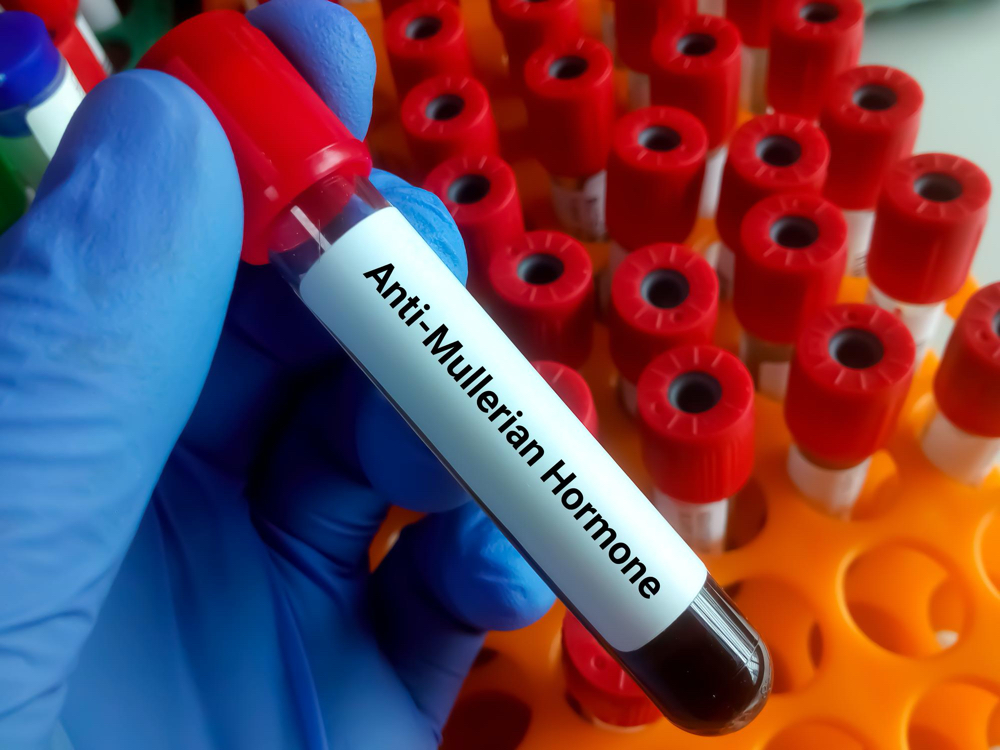- Fast results
- 4,000+ locations
- 4.8 star rating
Need Help? (888) GET LABS



A woman produces one egg a month for ovulation after the first menstrual cycle. However, this is not always the case. As a result, the number of eggs decreases over time as women age.
According to WebMD, 10% to 30% of people suffer from infertility and seek help due to the diminishing ovarian reserve. Likewise, as women grow older, egg production and the chance of getting pregnant decrease.
Thus, if you are a woman planning to start a family, you can take an Anti-Mullerian Hormone Test to know your egg count or ovarian reserve and other hormone tests for women.
There is so much to know about anti-Mullerian hormones and how it affects your fertility and reproductive health. So just read on.
Anti-Mullerian Hormone is a hormone produced by the granulosa cells in your small ovarian follicles, which is responsible for hormones, growth, and reproduction.
AMH plays a vital role in developing a baby’s sex organ during pregnancy. For example, AMH levels are higher for male babies to prevent them from developing a female reproductive organ. Meanwhile, female babies only need a small amount of AMH for growth and development.
Also, AMH levels correspond to women’s ovarian reserve and egg count for fertility.
Thus, the higher the AMH levels, the higher the ovarian reserve and egg count. Whereas the lower the AMH levels, the less likely to conceive a baby due to lower ovarian reserve.

Anti-Mullerian Hormone Test is a type of test which measures the anti-Mullerian hormones or AMH in your blood. Also, it is used to know the woman’s egg count or ovarian reserve.
Both men and women have AMH; however, this test is usually done on women to examine a woman’s reproductive health.
If you plan to start a family in your late twenties onwards, it is best to check your AMH levels to know the chances of pregnancy. Also, the test would be beneficial to spot any reproductive issues, if there are any.
For example, if you are experiencing PCOS symptoms like acne, weight gain, or unusual facial hair growth, then take the AMH levels test. It is best to know your chance of getting pregnant and seek professional help.
Also, you should get tested for AMH if you are diagnosed with endometriosis, ovarian tumors, cysts, or if you need to undergo IVF treatment or have irregular and painful periods.
Ultimately, if you are approaching the menopausal stage and still thinking of getting pregnant, you better take the AMH and other fertility tests.
You can take the Antimullerian Hormone AMH Blood Test to know your egg count for pregnancy or reproductive health.
This type of test evaluates the AMH level in the blood, as this hormone is secreted from the ovarian follicles and flows in your blood vessels.
In addition, AMH levels indicate a female’s fertility potential and the count of follicles that release eggs in the ovaries.
With that, this test is recommended for women who are planning to undergo in vitro fertilization as well.
Women are born with around 2 million eggs in the ovaries. Approximately 400 000 eggs remain in the puberty stage, and about 1000 eggs die each month. As the egg cells diminish, the AMH levels also naturally deplete.
If you take an AMH test, the result may provide information on your egg count. However, it does not evaluate the quality or health of your eggs. Additionally, it is an advantage to know if you have some underlying reproductive issues.
For example, if you have a low AMH level, this might indicate possible early menopause. Meanwhile, very high AMH levels can be an indicator of PCOS.
Women with higher AMH levels greater than 1ng/mL (nanogram per milliliter) usually have a usual ovarian reserve. Meanwhile, a lower number, less than 1 ng/mL, can indicate a woman’s diminished ovarian reserve (DOR). As a result, the ovaries produce fewer eggs, making them even harder to fertilize.
Low anti-Mullerian hormones can affect your fertility window, but you can still conceive a baby.
According to Modern Fertility, you can get pregnant and have a successful pregnancy even with low AMH levels. After all, you only need one healthy egg and sperm to conceive.
Additionally, if you have low AMH with a regular cycle and are still ovulating, then there’s a possibility of getting pregnant.
Thus, there is a slim chance of pregnancy if you have low AMH and a short fertility window. Therefore, it is crucial to be educated on fertility and plan for a successful pregnancy.
Physical symptoms are not evident if you have low anti-Mullerian hormones, but this can cause fertility and reproductive health issues.
One possible symptom of low AMH can be a shortened reproductive window to which your period to conceive is shorter.
This becomes even more essential for a woman planning to get pregnant through in-vitro fertilization. Hence, you must take the AMH level test to gauge the viability of your ova for freezing or IVF.
According to Shree IVF Clinic, the considered good or normal AMH levels for IVF are between 1.0 – 4.0 ng/ml. However, if you have AMH levels below 1.0ng/ml, it indicates that you have a low egg count and depleted ovarian reserve.
AMH is produced by the premature follicles, which eventually mature into an egg cell in the ovary. It is related to FSH (follicle-stimulating hormone) since it is the very hormone that stimulates the growth of the premature follicles.
If FSH is at high levels, it affects ovarian reserve and function, indicating low AMH.
According to a study published in the Journal of Ovarian Research, a woman’s AMH levels decrease with age. However, FSH increases as women get older.
It is crucial to know and learn about fertility and reproductive health, especially for women planning to start a family. Additionally, it is an advantage to understand how anti-Mullerian hormone tests can impact your plans to conceive a baby.
With that, it is better to have yourself checked today to have a bigger chance of having a successful pregnancy and prevent further reproductive complications, if there are any.

© Copyright 2025 Personalabs. All Rights Reserved.